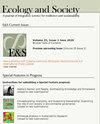Regenerative landscape design: an integrative framework to enhance sustainability planning
IF 3.2
2区 社会学
Q1 ECOLOGY
引用次数: 0
Abstract
Addressing contemporary environmental and social crises requires solutions-based, systems-level changes. To achieve these changes, transdisciplinary research approaches are needed to align problem framing with solution deployment at landscape scales. However, practical frameworks to guide this work are lacking. Here we propose a new framework to help bridge this gap: regenerative landscape design (RLD). We define RLD as a process for finding pattern-based solutions, emphasizing cooperative, iterative, and facilitated engagement for the co-production of locally relevant knowledge for desirable landscape stewardship. To do so, we review how key components of RLD (e.g., landscapes, design thinking, and regenerative processes) have been differentially and unevenly applied in disciplines ranging from resilience, landscape ecology, geography, architecture, agriculture, sociology, tourism, and more. We then put forward research considerations of a RLD approach to enhance social and environmental well-being. We use two emerging case studies (i.e., Chesapeake Bay Watershed, Pennsylvania, USA and Narok County, Kenya) to put forward pathways for implementation of the RLD strategy.再生景观设计:加强可持续性规划的综合框架
解决当代环境和社会危机需要基于解决方案的、系统层面的变革。为了实现这些变化,需要跨学科的研究方法来将问题框架与景观尺度的解决方案部署结合起来。然而,缺乏指导这项工作的实际框架。在这里,我们提出了一个新的框架来帮助弥合这一差距:再生景观设计(RLD)。我们将RLD定义为一个寻找基于模式的解决方案的过程,强调合作、迭代和促进参与,共同生产当地相关知识,以实现理想的景观管理。为此,我们回顾了RLD的关键组成部分(如景观、设计思维和再生过程)如何在弹性、景观生态学、地理学、建筑学、农业、社会学、旅游等学科中得到不同和不均匀的应用。然后,我们提出了RLD方法提高社会和环境福祉的研究考虑。我们利用两个新出现的案例研究(即美国宾夕法尼亚州切萨皮克湾流域和肯尼亚纳罗克县)来提出实施RLD战略的途径。
本文章由计算机程序翻译,如有差异,请以英文原文为准。
求助全文
约1分钟内获得全文
求助全文
来源期刊

Ecology and Society
环境科学-生态学
CiteScore
6.20
自引率
4.90%
发文量
109
审稿时长
3 months
期刊介绍:
Ecology and Society is an electronic, peer-reviewed, multi-disciplinary journal devoted to the rapid dissemination of current research. Manuscript submission, peer review, and publication are all handled on the Internet. Software developed for the journal automates all clerical steps during peer review, facilitates a double-blind peer review process, and allows authors and editors to follow the progress of peer review on the Internet. As articles are accepted, they are published in an "Issue in Progress." At four month intervals the Issue-in-Progress is declared a New Issue, and subscribers receive the Table of Contents of the issue via email. Our turn-around time (submission to publication) averages around 350 days.
We encourage publication of special features. Special features are comprised of a set of manuscripts that address a single theme, and include an introductory and summary manuscript. The individual contributions are published in regular issues, and the special feature manuscripts are linked through a table of contents and announced on the journal''s main page.
The journal seeks papers that are novel, integrative and written in a way that is accessible to a wide audience that includes an array of disciplines from the natural sciences, social sciences, and the humanities concerned with the relationship between society and the life-supporting ecosystems on which human wellbeing ultimately depends.
 求助内容:
求助内容: 应助结果提醒方式:
应助结果提醒方式:


